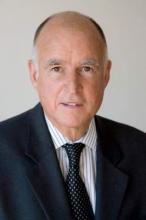A controversial bill that would allow physicians in California to assist terminally ill patients in dying will soon hit the desk of Gov. Jerry Brown Jr. (D) for approval. California lawmakers passed the End of Life Option Act on Sept. 11 after nearly a year of consideration.
Gov. Brown has 12 days to sign the bill into law, veto it, or allow it to become law without signature or veto. If Gov. Brown signs or fails to object, the law will become effective by January 2016. Gov. Brown has not indicated his stance on the issue.
If the bill is enacted, California will become the fourth state to allow physician-assisted suicide through its legislature. Oregon, Vermont, and Washington each have laws permitting physician-assisted death. Court rulings in New Mexico and Montana have allowed for the practice. However, litigation in those states is ongoing and the decisions have yet to be enforced.
California legislators introduced the End of Life Option Act in January, but later pulled it from the Assembly Committee on Health because of insufficient support. Assembly members later introduced a new version of the bill, which passed the assembly on Sept. 9 and the Senate on Sept. 11. Similar to Oregon’s law, the California bill would require two doctors to determine that a patient has 6 months or less to live before doctors could prescribe life-ending medication. Patients must have the mental capacity to make medical decisions and would have to physically be able to swallow the drugs.
Patients seeking physician aid in dying must submit two oral requests, a minimum of 15 days apart, and a written request to their physician. The attending physician must receive all three requests directly from the patient and not through a designee. Before prescribing end of life drugs, the attending physician must refer the patient to a consulting physician for medical confirmation of the diagnosis and prognosis and for a second determination that the patient can make competent medical decisions.
Recent court battles in California over physician-assisted suicide have ended with judges prohibiting the practice. In an Aug. 14 ruling, San Francisco Superior Court Judge Ernest Goldsmith ruled that granting the plaintiffs’ petition would essentially create a judge-made law. San Diego Superior Court Judge Gregory Pollack dismissed a similar lawsuit on July 27. Plaintiffs in both cases plan to appeal.
In May, the California Medical Association (CMA) became the first state medical society to change its stance against physician-assisted suicide to that of being neutral.
“The decision to participate in the End of Life Option Act is a very personal one between a doctor and their patient, which is why CMA has removed policy that outright objects to physicians aiding terminally ill patients in end of life options,” Dr. Luther F. Cobb, CMA president, said in a statement. “We believe it is up to the individual physician and their patient to decide voluntarily whether the End of Life Option Act is something in which they want to engage. Protecting that physician-patient relationship is essential.”
On Twitter@legal_med


